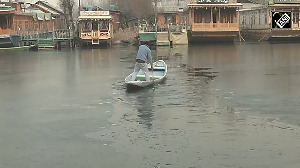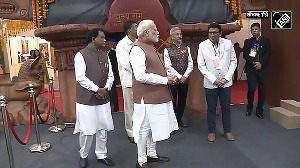Choices ranged from Nobel Prize-winning scientist Steven Chu, who has been chosen by President-elect Barack Obama to be Energy Secretary in the next administration, to professor, community leader and human rights activist Paul Fong, who was elected to a seat in the California assembly.
The eight-year-old Democratic organisation finally settled on Swati Dandekar, the Iowa assemblywoman who in the 2008 election cycle won a seat in the state senate.
"I was humbled, flattered, and honoured all at the time same time," said Dandekar, who heard the news as she was preparing Christmas dinner for the family. "What made my day was that the organisation had understood well the challenge that I had successfully faced."
Dandekar was referring to her decision to leave the comfort zone of a safe seat in the assembly and run for the state senate. The AAAF pointed out that Dandekar, who has served three terms as member in the Iowa House of Representatives, could have easily won re-election, but had chosen instead to contest for the senate, and that too by contesting a seat Republicans have held for almost two decades.
"That meant I had to go out campaigning in areas where people did not know me," she said. "But I had a clear agenda, and my platform based on education, health care and renewable energy must have appealed to many people." Dandekar won easily, with 54 percent of the vote.
'APA (Asian Pacific Americans) now have a state senate-level standard-bearer in a state not know for its high percentage of APAs,' the organisation said in a statement, pointing out that there are an estimated 13 million Asian Pacific Americans in the United States at this point in time.
The AAAF says it seeks to bring together 'progressive APA leaders from each of the major ethnic groups and from all over America.' Its executive director is Yale and Georgetown-educated lawyer Gautam Dutta.
'Across this country, Asian Pacific Americans of every ethnicity are disproportionately under-represented at every level and in every branch of government,' it says. 'They are the fastest growing minority group in the country. APA leaders rank among the country's elite in business, medicine, technology, science, and academia. Yet, in Congress, state houses, state legislatures, city halls, and courthouses across the country, APAs are noticeably absent. For example, just over one percent of the members of Congress and significantly less than one percent of federal and state judges are APAs.'
'Senator Dandekar's rise in politics has other lessons for APAs interested in community involvement, no matter where they live and no matter what their life circumstances, because she did not start life thinking that she would become a politician,' wrote journalist Phil Nash on the Fund's Web site, pointing to her gradual rise in politics starting as a volunteer worker, then becoming the president of the Parent Teachers Organisation and voter registration drives.
"My term ends in 2012 and I have a lot of work cut out for me," Dandekar, India Abroad Person of the Year 2002, told rediff India Abroad. "But I am also passionately interested in seeing hundreds of new faces from India and other Asian countries getting involved in politics, and making a change. I did not grow up here, but even as I was raising my two children -- I am a grandmother now -- I knew I could find a place in politics."
Her mantra, she said, is a quote by Winston Churchill. "I want every aspirant, particularly from the Indian-American community, to remember it," she said. "I have lived by it and it will guide me always. Churchill said: 'We make a living by what we get but we make a life by what we give.'"
Nash echoed those thoughts in his profile of the senator. 'Not everyone can be as smart, organised and compassionate as Swati Dandekar,' he wrote. 'But all of us can learn to get involved in our local communities, speak out on issues of concern to us and get beyond our comfort zones so that we can have more impact on the world around us.'






 © 2025 Rediff.com -
© 2025 Rediff.com -